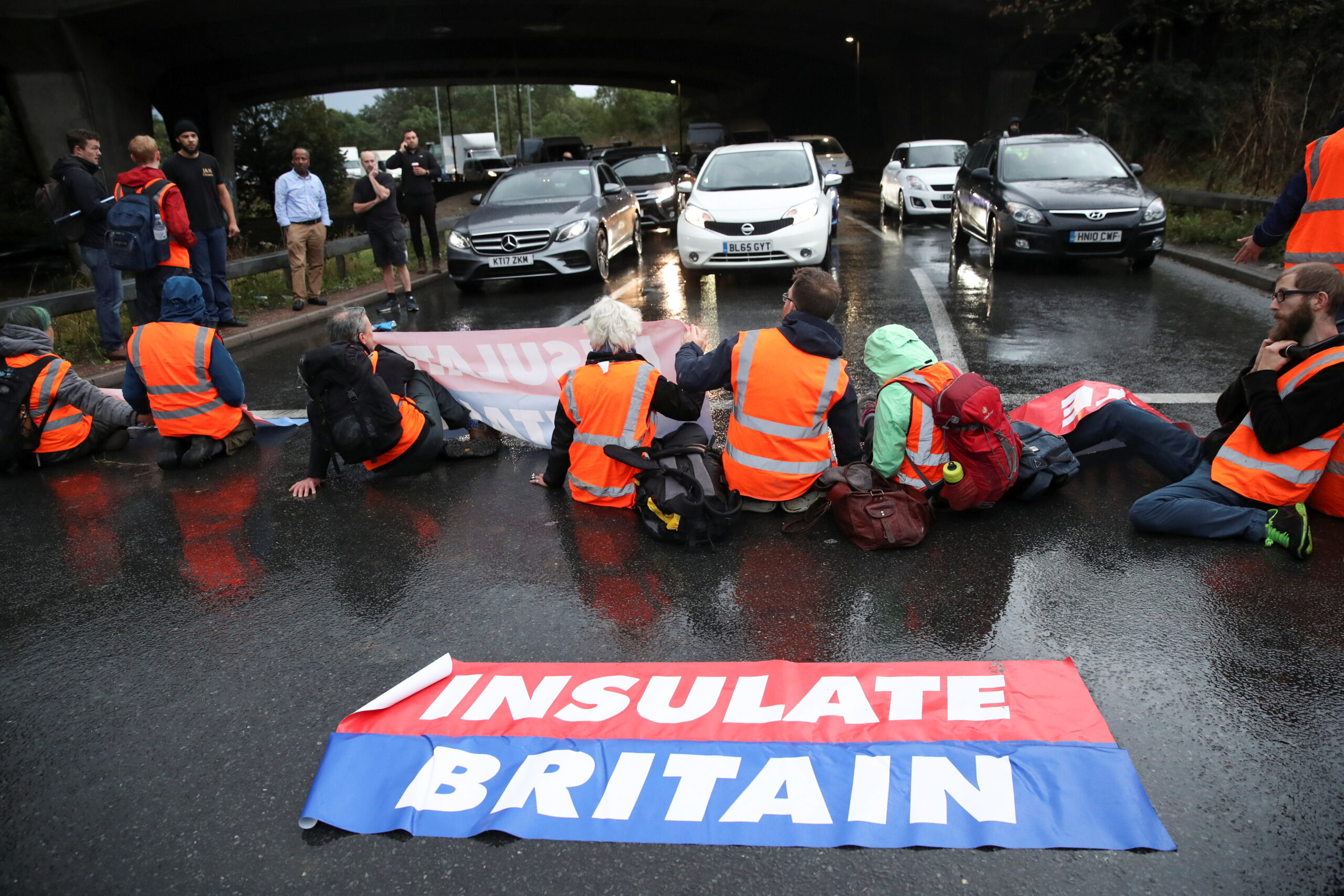Union Jacks and Churchill Quotes Won’t Save Insulate Britain
The group may be repeating the early follies of XR.
by Blyth Brentnall
15 November 2021

When groups of orange-vested protesters blocked the M25 motorway encircling Greater London in August, conflicts with drivers immediately caught the media’s attention. The newly launched climate group, Insulate Britain, has since kept journalists transfixed with repeated arrests, heated interviews and a determination to persist until they’re sent to prison.
In the context of run-away climate collapse, Insulate Britain’s urgent approach has much to be commended. The group’s parochial attachment to its eponymous island is designed to appeal to Britain’s patriotic psychology. Union jacks and Churchill quotes, though, are a likely dead-end politically.
Under attack from the right.
The activists in Insulate Britain risking their safety and freedom to highlight government failings deserve our utmost respect. Their demand is simple. With at least ten thousand people dying each winter due to fuel poverty, insulating every home in Britain by 2030 is a concrete and essential way of protecting disadvantaged households.
To put pressure on the government, the group’s strategy of escalated, sustained protest is vital, as it was for Earth First!, Act Up and the civil rights movement. Commentators have rightly voiced support for Insulate Britain’s disruptive tactics in the Guardian, iNews and the Conversation.
Criticising the upstart group, many corporate media outlets have lashed back against the disruption caused to motorists. GB News, trying its best to echo the borderline incitement found on the right of the US media scene, even encouraged drivers to run protesters over.
Entering the culture wars.
While the motorway blocks stoke controversy, Insulate Britain’s broader politics are more concerning for the climate movement.
From its name to the red, white and blue of its banner, Insulate Britain is trying to play to “the heart of the conventional and majority views of British people”, according to the group’s strategy document. The messaging aims to enter “in an extreme way into the central territory of the Right’s side of the culture war”, presenting itself as deeply “patriotic”.
This plan is implemented in part by quoting and referencing Winston Churchill online and in the media. Co-founder Liam Norton compared the group’s unpopularity to Churchill’s struggle to win support for war against Hitler on Good Morning Britain. It’s evident what kind of game is being played with right-wing viewers when Britain’s mythological hero is invoked. However strategic this may seem, the approach is unlikely to work.
Roger Hallam, co-founder of Insulate Britain and Extinction Rebellion before that, has described the group’s appeal to nationalism as “authentic popular democratic politics”, likening it to historically-successful leftist co-optation of nationalism.
Hallam reasons that the Labour party came to power in the 20th century off the back of such nationalism. This may have worked for Clement Attlee during the second world war and for Tony Blair’s “Cool Britannia” campaign – but it hasn’t borne fruits for those who’ve mimicked it since the 2008 financial crisis. Pandering to the nationalist right without a vision for economic change foundered for Ed Miliband. Since February 2021, when Keir Starmer pinned his hopes on union jacks and “dressing smartly”, his approval ratings have largely declined.
Another sort of nationalism Hallam draws on is anti-colonial independence struggles. Here, the contextual differences are even starker. Colonised populations uniting against their oppressors and calling for independent nation-states share little in common with white British people demanding insulation. Britain may face deadly energy inequality, but this will impact a large number of the country’s 8 million ethnic minority people too. The climate crisis won’t discriminate when it comes to national borders.
Hallam also highlights how Martin Luther King Jr’s ‘I Have a Dream’ speech frequently mentions the US. Nationalism, though, had little to do with King’s organising. Throughout his life and especially during the Vietnam War, the Baptist minister called fervently for internationalism as a Christian imperative.
In light of this, Insulate Britain’s nationalist approach appears strategically optimistic at best. To engage a broader following, the insurgents could easily have drawn on more progressive majority-held views. The NHS, for example, is a top policy issue for the British public, and some in Insulate Britain have opportunely highlighted how the NHS could collapse as the climate crisis progresses.
Insulate Britain’s political approach contrasts with the steady transformation of the once-naive Extinction Rebellion (XR). Since emerging in 2018, XR has developed an international perspective and largely abandoned its early veneration of the police. Conversely, Insulate Britain hopes to appeal to darker tendencies in the white British psyche, toying with nostalgia for a brutal colonialist. The group risks reinforcing the view that British people must put their compatriots first simply because they’re penned in by the same borders.
Ultimately, whether or not nationalism is a dead end, it’s unlikely that union jacks and Churchill quotes will override the fury of working-class motorists jammed up on the M25.
Blyth Brentnall is a writer active in social and climate justice struggles.


